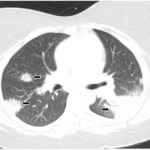When the pathologist called the next afternoon, I was fully prepared for disappointment. But there was an answer: Clusters of on-caseating granulomas were scattered throughout the specimen.
“As in sarcoidosis?” I asked.
“Yes, that is, if you’ve ruled out other causes of granulomatosis disease. It’s unusual for sarcoidosis to be confined to the bone marrow.”
I ran my hand through my hair before answering. “Well, sarcoidosis is an unusual disease. I’m good with that. Thanks.”
Sarcoidosis
Despite extensive investigation, the mystery of sarcoidosis has remained unsolved for more than 100 years. A recent case-control study (ACCESS) of more than 700 patients with sarcoidosis and nearly 30,000 relatives could not identify a single environmental, infectious agent or genetic locus to explain the pathogenesis of the disease.2 Familial clustering of sarcoidosis was first recognized 80 years ago, and various infectious triggers have been suggested, but even with increasingly sophisticated testing, no specific trigger has been implicated.
Long-Term Management
The patient, Mrs. N, initially responded well to corticosteroids, but relapsed at an unacceptably high daily dose of daily prednisone. A trial of infliximab was not steroid sparing. The patient has been on monthly IV tocilizumab and low-dose prednisone for the past two years, with good control of her disease.
Charles Radis, DO, is a rheumatologist in Portland, Maine, and director of clinical research for Rheumatology Associates.
Reference
- Petersdorf RT, Beeson PB. Fever of unexplained origin: Report on 100 cases. Medicine (Baltimore). 1961 Feb;40:1–30.
- Rybicki BA, Iannuzzi MC, Frederick MM, et al: Familial aggregation of sarcoidosis. A case-control etiologic study of sarcoidosis (ACCESS). Am J Respir Crit Care Med. 2001 Dec 1;164(11):2085–2091.


